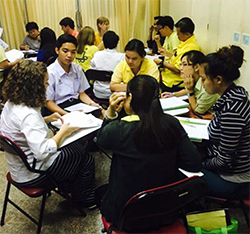Walking down the streets of Bangkok, Thailand, I saw the handicapped selling lottery tickets and knock-off sunglasses to pay for their next meal. I saw a beggar crouched in the corner of a stairwell, his hands clasping a paper cup. I saw bald, orange-clad monks asking for food offerings for their monastery. I saw an old woman presenting drinks before a spirit house. I saw the most intricate and magnificent architecture constructed to honor an idol made by human hands. I saw graffiti on an overpass that read, “Where is the hope?”
About 97 percent of the people in Thailand are Buddhist. They believe all life is suffering, and the only way to escape suffering is to let go of all earthly cravings. They think if they do good things, they will reincarnate with a better lot in life, perhaps as a rich man. The goal is to eventually reach Nirvana, where they will be released from rebirth. However, most Buddhists believe that only four or five people actually ever reached this state. To me, this seems so hopeless.
 As a Christian, my hope is not in myself, nor is it in my ability to do good things. I know I fail on a daily basis. I trust in Christ’s perfect sacrifice to pay for my sins. It is freeing to know my salvation is not based on my works, but on Christ’s worth. This is the hope my team and I sought to share with Thai university students early this summer.
As a Christian, my hope is not in myself, nor is it in my ability to do good things. I know I fail on a daily basis. I trust in Christ’s perfect sacrifice to pay for my sins. It is freeing to know my salvation is not based on my works, but on Christ’s worth. This is the hope my team and I sought to share with Thai university students early this summer.
We used teaching English to build relationships and share the gospel. My team and I had spiritual conversations with about 50 people over just three weeks. I developed a particularly strong relationship with three girls. They came to English camp, joined us for shopping trips, and read Bible stories with us.
 While none of them came to Christ, one is really interested. She came to meet with me as soon as she got off of work to read Bible stories. She was so excited to learn about the unconditional love of God. It was so contradictory to the unfeeling force of karma she had grown up learning about. She believed people get what they deserve. I shared the liberating power of mercy and grace. With God’s strength, I shared his hope. I am praying God will continue to increase her curiosity and desire to learn about the Bible and that he will use the Thai believers to lead her to Christ.
While none of them came to Christ, one is really interested. She came to meet with me as soon as she got off of work to read Bible stories. She was so excited to learn about the unconditional love of God. It was so contradictory to the unfeeling force of karma she had grown up learning about. She believed people get what they deserve. I shared the liberating power of mercy and grace. With God’s strength, I shared his hope. I am praying God will continue to increase her curiosity and desire to learn about the Bible and that he will use the Thai believers to lead her to Christ.
When talking to other students I met at a local language school, I entered every conversation thinking, “How can I share the gospel with this person?” It was such a different mindset than I have back home. But the more I did it, the more natural it became. So I began to think: How different would my life be if I was always this intentional with my conversations? What if I saw evangelism as less of a project and more of a lifestyle?
In the Great Commission, Christ commands his followers to “go and make disciples of all nations.” But in the Greek, “go” is most accurately translated “as you go,” meaning as you go about your daily life. While I believe Christ calls missionaries to spread the gospel all over the world, I also believe he is calling each of us to be on mission as we go to our jobs, classes, meetings and homes. My trip has given me an urgency to continue to share the gospel in my daily life just as I did in Thailand. So, wherever I see hopelessness, whether it be on the streets of Bangkok or on the campus of my university, I feel continuously convicted to share the hope of Christ.
Grace Mitchell, a student at Hardin-Simmons University, served with Go Now Missions in Bangkok, Thailand.
















We seek to connect God’s story and God’s people around the world. To learn more about God’s story, click here.
Send comments and feedback to Eric Black, our editor. For comments to be published, please specify “letter to the editor.” Maximum length for publication is 300 words.